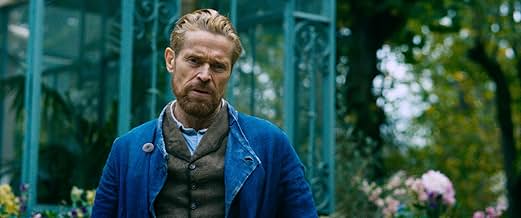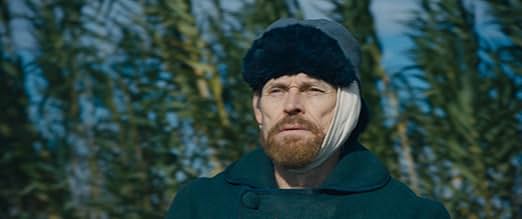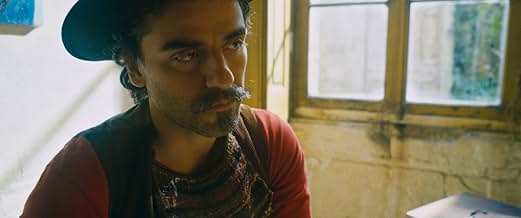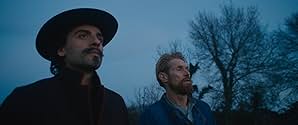IMDb-BEWERTUNG
6,9/10
42.800
IHRE BEWERTUNG
Ein Blick auf den Teil des Lebens des Malers Vincent van Gogh, in dem er in Arles und Auvers-sur-Oise (Frankreich) lebte.Ein Blick auf den Teil des Lebens des Malers Vincent van Gogh, in dem er in Arles und Auvers-sur-Oise (Frankreich) lebte.Ein Blick auf den Teil des Lebens des Malers Vincent van Gogh, in dem er in Arles und Auvers-sur-Oise (Frankreich) lebte.
- Regie
- Drehbuch
- Hauptbesetzung
- Für 1 Oscar nominiert
- 3 Gewinne & 16 Nominierungen insgesamt
Clément Paul Lhuaire
- Emile Bernard
- (as Clément Lhuaire)
Alan Aubert
- Albert Aurier
- (as Alan Aubert-Carlin)
- …
Empfohlene Bewertungen
The last years of Vincent van Gogh with his extreme sensitivity and mental instability. It's perfectly filmed with a colorful and adequate staging. And Willem Dafoe plays brilliantly!
At Eternity's Gate is perhaps one of the most artistic films that I've seen. It somehow manages to give the sense that it took Van Gogh's painting style and put it in film form, and it was quite effective.
I'll just start by saying At Eternity's Gate is not a movie that will work for everyone. The directing style used is not very common. There are plenty of shaky cameras, as well as many uses of first person point of view and weird dialogue loops. There are many sequences of no dialogue at all, where you are simply watching Van Gogh walking in a field or just painting. There are also lengthy sequences of only dialogue, some for 5 minutes at a time. Some people may find this film boring or even just annoying to try to watch. I, however, really appreciated the artistic directing style and approach to this film. It is also a beautifully shot movie. When Van Gogh is walking through nature, the shots, albeit sometimes a little shaky to fit the style, really capture the beauty of his surroundings in a way that can be breathtaking at times.
As for the plot of this movie, there really isn't one. You should instead think of it as a collection of scenes put together, roughly in order, that illustrate various key experiences near the end of painter Vincent Van Gogh's life. This will make the film a bit less confusing. Sitting there trying to connect everything you see under one plot would be very difficult, so it's better to just watch it scene by scene as you move through Van Gogh's life and try to get a sense of his motivations and state of mind. I found this to be a very interesting decision, but it added to the creativity of the film and made it feel more like a piece of art, so I understood and even appreciated this odd strategy.
The main thing this film tries to do is show the mental state of Van Gogh and almost try to get inside his head. This made for some very odd sequences in the film, but also made for a very unique and interesting movie. It might not work well 100% of the time, but for the most part, I was fascinated with the way they attempted to convey Van Gogh's mental instability.
Willem Dafoe in the lead role gives an outstanding performance (not that it's unexpected for that to happen). He portrays both the crazy and likable sides of Van Gogh to perfection, and really captures the incredible passion he had for art and painting. Oscar Isaac also gives a great performance as Gauguin, the other artist who's a little crazy (albeit much less so than Van Gogh). The rest of the cast holds there own as well, and the characters are all interesting to learn about.
The music in this film is also a bit strange at times, but seems to fit very well with the style and subject matter of the movie, and even is able to enhance the beauty of Van Gogh's surroundings when he is walking through nature.
At Eternity's Gate is a film that may not be for everyone, but it's creativity and great performances make it worth watching if you can manage watching the unique directing style.
I'll just start by saying At Eternity's Gate is not a movie that will work for everyone. The directing style used is not very common. There are plenty of shaky cameras, as well as many uses of first person point of view and weird dialogue loops. There are many sequences of no dialogue at all, where you are simply watching Van Gogh walking in a field or just painting. There are also lengthy sequences of only dialogue, some for 5 minutes at a time. Some people may find this film boring or even just annoying to try to watch. I, however, really appreciated the artistic directing style and approach to this film. It is also a beautifully shot movie. When Van Gogh is walking through nature, the shots, albeit sometimes a little shaky to fit the style, really capture the beauty of his surroundings in a way that can be breathtaking at times.
As for the plot of this movie, there really isn't one. You should instead think of it as a collection of scenes put together, roughly in order, that illustrate various key experiences near the end of painter Vincent Van Gogh's life. This will make the film a bit less confusing. Sitting there trying to connect everything you see under one plot would be very difficult, so it's better to just watch it scene by scene as you move through Van Gogh's life and try to get a sense of his motivations and state of mind. I found this to be a very interesting decision, but it added to the creativity of the film and made it feel more like a piece of art, so I understood and even appreciated this odd strategy.
The main thing this film tries to do is show the mental state of Van Gogh and almost try to get inside his head. This made for some very odd sequences in the film, but also made for a very unique and interesting movie. It might not work well 100% of the time, but for the most part, I was fascinated with the way they attempted to convey Van Gogh's mental instability.
Willem Dafoe in the lead role gives an outstanding performance (not that it's unexpected for that to happen). He portrays both the crazy and likable sides of Van Gogh to perfection, and really captures the incredible passion he had for art and painting. Oscar Isaac also gives a great performance as Gauguin, the other artist who's a little crazy (albeit much less so than Van Gogh). The rest of the cast holds there own as well, and the characters are all interesting to learn about.
The music in this film is also a bit strange at times, but seems to fit very well with the style and subject matter of the movie, and even is able to enhance the beauty of Van Gogh's surroundings when he is walking through nature.
At Eternity's Gate is a film that may not be for everyone, but it's creativity and great performances make it worth watching if you can manage watching the unique directing style.
This film doesn't follow the Hollywood structure. It's not a biography like you might expect, and the plot isn't defined. Instead, this is an attempt to get inside Van Gogh's head, and a brilliant one at that. Imagine being the world's greatest artist, with zero validation and constant ridicule by the establishment around you. That's the torturous state of being this film encapsulates and does it with purpose. At times, the cinema language gets more experimental than necessarily to accomplish its goal, but I commend the director for pushing the boundaries of standard filmmaking and letting us inhabit Van Gogh's mind for this brief period. I genuinely felt a loss for this escape from my own mind when Van Gogh passed. I recommend anyone involved with artistic or creative thinking to watch this film.
Vincent Van Gogh was a tortured soul that was, paradoxically, obsessed with beauty and wonder. Julian Schnabel (director) tries to give us a glimpse into the mind of the painter with this film and he delivers. This movie is not a biopic. It is more of an homage, an attempt to make us look at the world the way Vincent did.
With a dynamic camera, often hand-held, we wander around with Van Gogh (Willem Dafoe) trying to find interesting and striking images of nature, villages, people... The camera is always searching; different lenses, different angels, different distances... It finds new and inventive ways of filming. For example the split diopter is used, not to bring two objects into focus, but to blur par of the screen; and since Vincent had an eye condition, we are truly put in the artists shoes. Such a shame the movie at times loses itself in its eager to find yet another camera angle.
Sometimes a voice-over paints another image on top of what is shown. The score paints an atmosphere of ecstasy with a darker undertone. And Willem Dafoe paints an A+ performance, but he does it so well other actors sometimes disappear into his shadow.
Yet, this movie is an experience worth exploring. However it's tempo occasionally falters and instead of one long smooth stroke over the canvas, it sometimes feels more like a rough patchwork of different stories. It's sometimes messy, sometimes incredibly beautiful. Quite like Van Gogh.
This movie is not for everyone. Those who shiver when encountering vague, artsy-fartsy movies that call themselves art, better turn elsewhere. But those who can appreciate this way of filming and especially those who love Van Gogh's work, will adore this dreamlike exploration of Vincent's mind.
With a dynamic camera, often hand-held, we wander around with Van Gogh (Willem Dafoe) trying to find interesting and striking images of nature, villages, people... The camera is always searching; different lenses, different angels, different distances... It finds new and inventive ways of filming. For example the split diopter is used, not to bring two objects into focus, but to blur par of the screen; and since Vincent had an eye condition, we are truly put in the artists shoes. Such a shame the movie at times loses itself in its eager to find yet another camera angle.
Sometimes a voice-over paints another image on top of what is shown. The score paints an atmosphere of ecstasy with a darker undertone. And Willem Dafoe paints an A+ performance, but he does it so well other actors sometimes disappear into his shadow.
Yet, this movie is an experience worth exploring. However it's tempo occasionally falters and instead of one long smooth stroke over the canvas, it sometimes feels more like a rough patchwork of different stories. It's sometimes messy, sometimes incredibly beautiful. Quite like Van Gogh.
This movie is not for everyone. Those who shiver when encountering vague, artsy-fartsy movies that call themselves art, better turn elsewhere. But those who can appreciate this way of filming and especially those who love Van Gogh's work, will adore this dreamlike exploration of Vincent's mind.
This film tackles the story of an artist creating masterpieces for later generations but not for his own. All the techniques that bothered other reviewers--the handheld camera, loud piano soundtrack, looped dialog--all emphasized a life of loneliness and ridicule that made the audience experience those emotions.
Clearly the story lacked a typical plot, not so much because it wasn't there as much as that Van Gogh's story is so well known and portrayed. I sensed that my companions may have been wishing they had chosen a different movie but for me this film further added to the tapestry of Van Gogh's unique story. Plus the film addresses the two biggest points of contention about him ... his ear and his death ... and suggests that Van Gogh's character traits have turned those into unsolvable mysteries.
Clearly the story lacked a typical plot, not so much because it wasn't there as much as that Van Gogh's story is so well known and portrayed. I sensed that my companions may have been wishing they had chosen a different movie but for me this film further added to the tapestry of Van Gogh's unique story. Plus the film addresses the two biggest points of contention about him ... his ear and his death ... and suggests that Van Gogh's character traits have turned those into unsolvable mysteries.
Wusstest du schon
- WissenswertesWillem Dafoe was 62 when the film was released, 25 years older than Vincent van Gogh, who died at age 37.
- PatzerTheo tells Vincent at the hospital that he is now married. In reality Vincent received a letter from his brother on Dec 23rd 1888, in which he announced his engagement. Vincent feared that his brother would not be able to support him, once married. Additional to this he had the argument with Gaugin that night over Paul leaving. Mentally disturbed by all this he cut his ear off.
- Zitate
Vincent Van Gogh: Maybe God made me a painter for people who aren't born yet.
Priest: Possibly.
Vincent Van Gogh: It is said, Life is for sowing. The harvest is not here.
- Crazy CreditsThere's a mid-credits scene, where a Paul Gauguin quote is narrated.
- VerbindungenFeatured in Sven Uslings Bio: 2019 Års sämsta biofilmer (2020)
Top-Auswahl
Melde dich zum Bewerten an und greife auf die Watchlist für personalisierte Empfehlungen zu.
- How long is At Eternity's Gate?Powered by Alexa
Details
- Erscheinungsdatum
- Herkunftsländer
- Offizielle Standorte
- Sprachen
- Auch bekannt als
- Van Gogh en la puerta de la eternidad
- Drehorte
- Produktionsfirmen
- Weitere beteiligte Unternehmen bei IMDbPro anzeigen
Box Office
- Bruttoertrag in den USA und Kanada
- 2.294.915 $
- Eröffnungswochenende in den USA und in Kanada
- 92.856 $
- 18. Nov. 2018
- Weltweiter Bruttoertrag
- 11.519.666 $
- Laufzeit
- 1 Std. 51 Min.(111 min)
- Farbe
- Seitenverhältnis
- 2.35 : 1
Zu dieser Seite beitragen
Bearbeitung vorschlagen oder fehlenden Inhalt hinzufügen




































